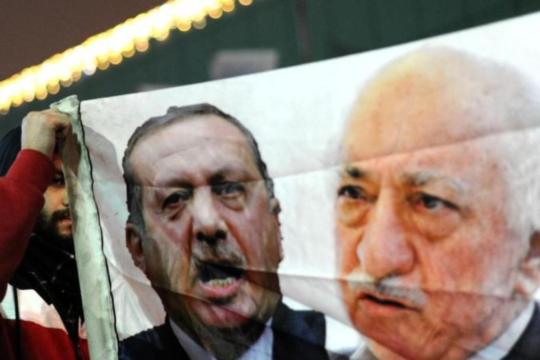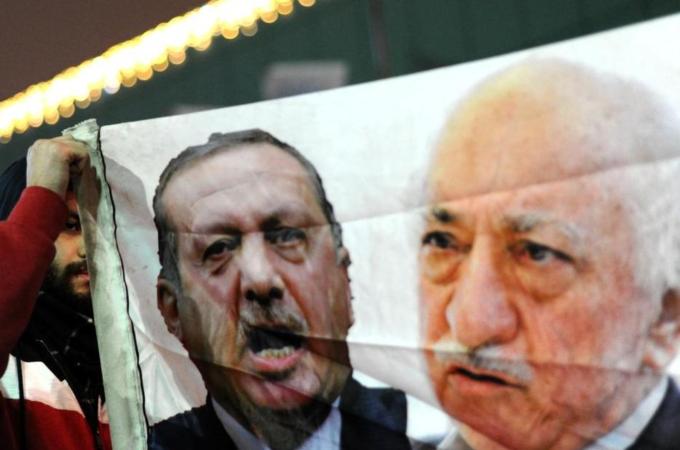
 |
|
Political battle between Prime Minister Recep T. Erdogan and Fethullah Gülen movement in Turkey [AFP] |
| Abstract While Erdogan saw the relationship between his Justice and Development Party (AKP) and Fethullah Gülen’s movement as a natural reflection of mobilized Islamic conservative forces, the relationship has been a subject of debate and many leaders of the party felt that a clash between the two sides was inevitable. Although the movement’s rhetoric has been centred on distancing itself from politics, it has not hidden its desire to play a political role or be represented within the state apparatus. The Gülen movement was helpful to Erdogan in the past in his campaign against the Kemalist current in the administration and the army, but with the demise of this common threat, differences have emerged between the former allies on the administration of the Turkish state. |
Introduction
Since the December 17, 2013 arrest campaign of 50 Turkish officials, sons of ministers and businessmen in Turkey on the orders of Deputy General Prosecutor Zakaria Oz in Istanbul, Turkey has been witnessing a political and economic crisis, with consensus that corruption is a major factor in the escalating conflict between the ruling Justice and Development Party (AKP) and the Fethullah Gülen movement. While both groups are considered Islamic conservatives, conflict continues to escalate as emboldened opposition parties demand Prime Minister Recep T. Erdogan’s resignation and the country’s economy weakens, a serious blow after years of prosperity.
In response to the arrest campaign coordinated by officials close to the Gülen movement, Erdogan’s government transferred and dismissed dozens of policemen in Istanbul. The saga did not end there, with a second round of warrants issued December 25, 2013, again alleging corruption by business leaders and government employees.
This paper explores the reality of the corruption cases, offers a brief history of the Gülen movement, discusses why the conflict between the AKP and the Gülen movement arose at this time and ends with effects this crisis will have on Turkey’s political and economic landscapes.
Political battles waged in court
The December 17, 2013 cases initiated by Deputy General Prosecutor Zakaria involved three key lawsuits: one against a Turkish-Azerbaijani businessman, one against the Fatih mayor, and one against a number of senior statesmen and governors accused of facilitating government contracts to ensure specific companies would win them. More than 50 people were initially summoned for questioning, a clear indication the cases were orchestrated for political impact more than they were for judicial necessity. Over the next two days, the number of those arrested rose from 50 to 66, and evidence emerged that the suspects’ phones, as well as those of their wives in some cases, had been tapped for over 10 months without supervision from senior police officers. The Republic People’s Party pre-empted preliminary investigation results and immediately demanded the government’s resignation, and some opposition media volunteered to publish leaks from case files.
There were two public responses from Erdogan’s government. The first was from Deputy Prime Minister Bulent Arinc who condemned corruption but also expressed amazement at the way the cases were handled, particularly the extensive wire-tapping and the rush to issue a verdict before the cases reached the court. The second was Erdogan’s comment on the case during a press conference while visiting the Hungarian prime minister. Erdogan reiterated fighting corruption as a cornerstone of his government’s platform, and announced his government’s determination to eradicate power of secret groups hiding within the administration (the “state within the state”). While he did not mention the Gülen movement by name or the link between Zakaria Oz and the Gülen movement, it was clear to all those in attendance Erdogan was referring to them.
Officials close to the Gülen movement, such as Public Prosecutor Muammar Akash, continued the smear campaign through the media in the coming days. Akash leaked the second case to the media before notifying the Attorney General’s Office in Istanbul, and because officers under his supervision in the Istanbul police force had been transferred, Akash found himself unable to enforce the arrest warrants, particularly given his misconduct in leaking the information to the media. In the following days, many of those summoned for questioning were released, some due to lack of evidence and others due to delayed trials. The Azerbaijani businessman in one of the key cases alleged that police officials had asked him for bribes during meetings he recorded. He subsequently handed these recordings over to public prosecutors.
In short, a prominent lawyer described one of the lawsuits in the following manner after reviewing it: “Most of the evidence in the case is fragile, and some of it was collected under questionable circumstances.”
Gülen movement history
For months before the corruption cases surfaced, Turkish media had speculated about escalating tensions between the Gülen group and Erdogan’s AKP government. Both prosecutors involved, Oz and Akash, and most of the policemen who executed the arrest orders, were known Gülen sympathizers. The crisis served to highlight an already rocky relationship between the two groups.
The Gülen movement dates back to the Nursi order, born out of Muslim cleric Said Nursi’s (1896-1960) resistance against anti-Islamic policies the republic of Turkey adopted in its early decades. After Nursi’s death, his followers were divided into various groups, organizations and cultural institutions – one of which was Fethullah Gülen’s group. After the 1980 coup d’état mainly targeting political Islam and the leftists, Gülen, formerly an imam, became more active in political life.
In the 1990s, the movement became a source of anxiety for the authorities and the military, especially after a tape recording of a meeting between Gülen and some of his close followers revealed his eventual goal of changing the Turkish government from secular to Islamic. Given Gülen’s weak ties with the Welfare Party led by Necmettin Erbakan, he chose to support the AKP in the 2002 elections in return for the group’s freedom to conduct its activities in the country.
The agreement worked relatively well until the Marmara ship incident in May 2010 (also known as the Gaza flotilla incident), when Israeli commandos attacked an aid ship on its way to Gaza. The Gülen movement blamed Erdogan for what happened, causing the AKP to accuse Gülen of supporting Israel. Peace-process dealings with the Kurdish Workers’ Party (PKK), considered a terrorist group, were also seen as a point of contention between the two groups.
The two more recent crises, those which are directly related to the current showdown between the two groups, are the prep school and corruption crises. After the government announced it was taking steps which would affect prep schools, many of which are run by the Gülen movement, Gülen-controlled media began a loud campaign against Erdogan. People close to the movement’s leader publicly announced they would not support the AKP in upcoming elections. An escalating campaign by AIPAC, America’s pro-Israeli lobby, simultaneously accused Turkey of facilitating Iranian trade, adding an unexpected and somewhat external dimension to the corruption crisis.
There are several other areas of contention, but most major is the AKP’s grievance that Gülen wants a say in the state without forming a political party, having a program or being held accountable to the people and public opinion. AKP supporters believe the Gülen movement is intent on removing Erdogan in order to achieve their political goals. Gülen supporters deny involvement in politics and plans to permeate the Turkish state, saying its adherents reached any official or political posts as a result of their capabilities.
Political and economic implications
The emerging divide between the two groups has left visible marks on the country’s political and economic landscapes. This section of the paper will discuss those implications.
The courts and law enforcement, two groups closely related to the Gülen movement, were a political focus for Erdogan as he attempted to deal with the aftermath of the corruption crisis. Hundreds of police officials have already been transferred in a clean-up campaign, and it is likely that Erdogan will soon amend the structure of the High Council of Judges and Prosecutors and the privileges of the Council of State, making both bodies less susceptible to political pressure.
A clear political implication was seen on December 25, 2013, when Erdogan reshuffled his cabinet, something he was already planning to do. While the magnitude of the reshuffle was unexpected, it was also a natural response to the corruption charges. Erdogan appointed non-member of the parliament Efkan Ala as the Minister of Interior. Ala is known for his tough stances and his appointment displayed Erdogan’s commitment to cleaning up the ministry and purifying it of secret movements.
Electoral calculations are another political implication of the recent crises in Turkey, particularly with local elections slated for March 2014. Estimates indicate the Gülen movement’s electoral weight does not exceed two per cent, while the AKP’s weight is still estimated above 45 per cent, meaning the AKP will likely win local elections if it manages to maintain its public approval ratings over the next three months. The passage of time may lower this weight, but the AKP’s strong track record and response to the corruption cases means it will take a while before any negative impact can be measured.
Economically speaking, there have been clear implications, particularly given judicial orders freezing several prominent businessmen’s accounts. By the end of December 2013, the Turkish lira had lost 10 per cent of its value against the dollar. Some government sources estimated that GDP losses totalled around one hundred billion dollars at the time, but during the first days of the new year, the lira and Turkish financial markets rallied a bit, especially after it became clear the crisis would not bring down the government and that Erdogan was taking drastic action to address the Gülen movement’s strikes at the state.
Where is Turkey headed?
Since the success of the 2002 elections cooperation between the AKP and Gülen movement to eradicate Kemalist currents, the relationship between them has been the subject of debate. Erdogan initially saw the relationship as a natural reflection of Islamic conservative forces mobilized behind his party leadership, while other party leaders foresaw an inevitable clash. Inconsistency between the Gülen movement’s stated desire to distance itself from politics while its leaders pursued representation in the state apparatus means it has sought and continues to seek a political role. Deep differences between the former allies have emerged with the demise of a common threat.
The corruption cases are not unfounded, and the courts must be allowed time to address them; however, the amplification of the cases via media implies the Gülen movement had a political intention. What they did not take into consideration was Erdogan and the AKP’s abilities to fight back after over a decade of navigating Turkey’s government structure. Gülen’s movement also overestimated their own political power to bring Erdogan down.
It is likely that Erdogan will succeed over the next few months in dismantling elements of this “state within the state,” particularly within law enforcement circles. Steps he has taken thus far show his determination to achieve this goal, and local and national party and constituent support are present beyond any doubt. It is premature, however, to foretell the true impact of the corruption scandal and its political implications on elections. It is likely the AKP will win in the upcoming elections with a margin not narrower than the party’s win four years ago. However, an extended crisis atmosphere will force the party and its leader to consider one of two options. They must decide if it is better for Erdogan to leave the party’s bylaws intact, relinquish his post and run for the presidency next summer, or instead work on amending the party’s bylaws (which do not allow a parliamentary candidate to run for more than three consecutive terms) and subsequently call for an early election next fall.